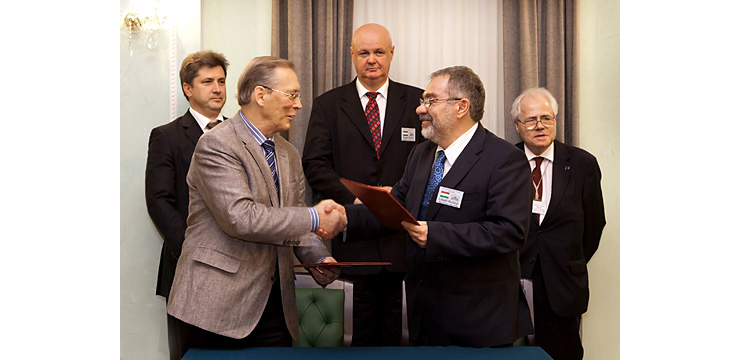JINR – Hungary: a new type of cooperation
News, 29 September 2012
Vice-Director of the National Innovation Office of Hungary László Korányi visited JINR on 27-29 September 2012. He was accompanied by counselors of the Hungarian Embassy in Moscow Árpád József Érden and György Miklós Palásthy, and member of the JINR Scientific Council Scientific Advisor of the Wigner Research Centre for Physics Dénes Lajos Nagy. An exhibition of Hungarian companies was opened in the frames of his visit in the International Conference Hall.
– In Hungary, there are many world-class innovative companies we are proud of, – head of the delegation told to journalists. – We believe that through these companies we really come to development of cooperation. In our country there are many scientists who work with Dubna, they are agents of this collaboration, and they, of course, can help us. We believe that we can develop relationships between scientists and companies at the same time. The Government is interested in it.
Six firms supplying high-technology, high-precision products to world markets were represented. Representatives of enterprises acquainted members of the JINR Scientific Council with products, history and commercial achievements of companies.
– Our company specializes in manufacturing of equipment for research using neutron scattering. We produce diffractometer equipment – says Director General of the company ANTE Peter Harmat. – The technique is new, the goal of our products to optimize and streamline data acquisition and processing. This is a commercial firm, which is a subsidiary of a state research center.
– The National Instruments is an international company with headquarters in the United States – says regional representative Artem Ivanissov. – Our manufacture is situated in Hungary. About a thousand people are employed at this manufacture now; it is a rather large enterprise. We produce equipment from detectors of particles and ending with automatization and monitoring of accelerators and reactors. National Instruments provides equipment for the LHC at CERN, the ITER project. We share a very close relationship with them; we could extend that experience through collaboration with JINR.
At the end of the meeting of the JINR Scientific Council a round table discussion was held in the JINR Club of Scientists. FLNP Director A.V. Belushkin spoke about basic stages of relations between Hungarian and Dubna specialists. Hungary was a member state of JINR until 1992. The most active phase was in the 1970s and 1980s, then Hungarian scientists were involved in research on theoretical physics, study of condensed matter, development of data processing systems. An agreement on cooperation between JINR and the Hungarian Academy of Sciences was signed in 2001.
In December 2008, in Budapest JINR Days in Hungary were successfully held; this was to promote revitalization of cooperation, but financial situation of the Hungarian Academy of Sciences did not allow it. In March 2009, a "Memorandum of Understanding on the proposed joint activity at JINR in Dubna" was signed in the frames of the intergovernmental commission; this was the next step to restore Hungary at JINR.
– Hungarian scientists interested in cooperation with Dubna – says Dénes Lajos Nagy – and we believe that in the frames of economic and technological cooperation, which is in another form, we will resume technical and scientific joint work. We have very interesting companies, for example creation of mirrors for neutron experiments. FLNR is interested in work with a company that manufactures equipment for electron microscopy. There is an international company National Instruments, which, I’m sure, has something to offer for Nuclotron-NICA.
Presentations of Hungarian firms were held in the frames of the round table, on the JINR side representatives of laboratories spoke about studies that may interest Hungarian scientists and businessmen. The business part of the visit was concluded by the signing of a letter of intent between JINR and the National Innovation Office by Victor Matveev and László Korányi; the letter declares interest of the Hungarian government to seek ways to develop cooperation with Dubna. A letter of intent between the Frank Laboratory of Neutron Physics and the firm Mirrotron which produces neutron optics was also signed.
Galina Myalkovskaya (JINR weekly newspaper "Dubna: science, community, progress")
Photo by Elena Puzynina
